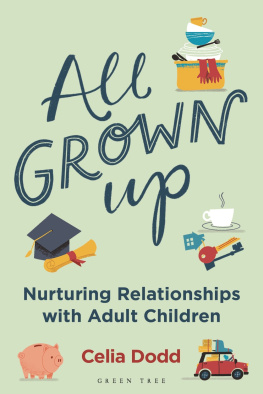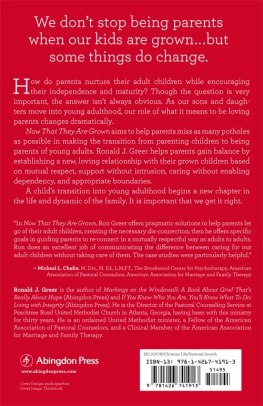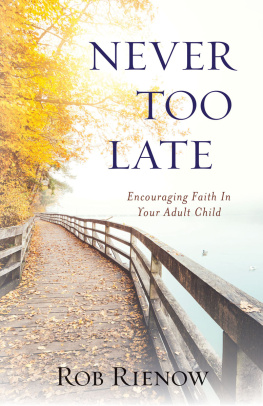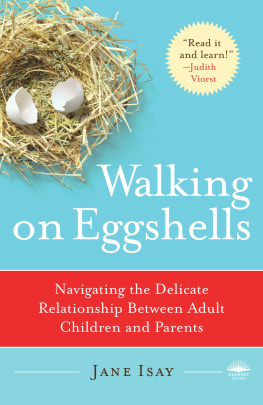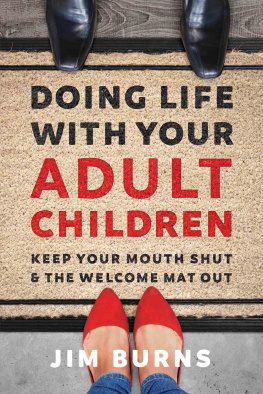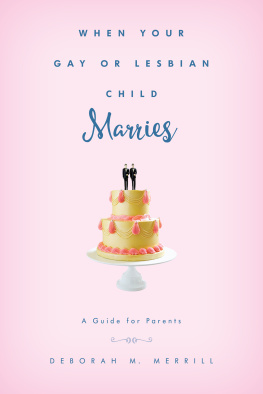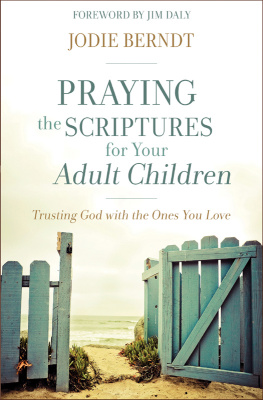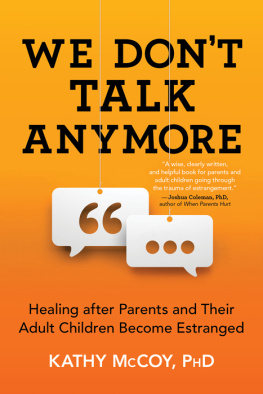
For Paul, Adam and Alice

Contents
Im very grateful to all the parents and adult children who talked to me about their relationships so honestly and thoughtfully; this book would be nothing without their insights and experiences. A big thank you also to the psychotherapists, psychologists and the experts on young adult mental health and eating disorders, who gave up so much time to share their knowledge and wisdom with me. Their contribution is invaluable. Thank you also to Aggie MacKenzie for her thoughtful reading of the manuscript. And while this book is not about my own children, my experiences as a parent inevitably inform my work and Im grateful to them, and to my daughters-in-law, for their support and understanding.
A massive thank you to all the team at Bloomsbury, especially my brilliant and incisive editors, Charlotte Croft and Holly Jarrald, the copy editor Jane Donovan and the proofreader Jenni Davis, and to my agent, Laura Longrigg. Finally, thank you to the staff of the British Library for creating a great environment to work in.
The relationship between parents and their adult children is one of the most important in their lives and lasts far longer than the 20-odd years that it took them to grow up. It has a huge impact on well-being and how parents feel about themselves yet it gets remarkably little attention. The impression is that once children are grown up, the parents job is done and the relationship becomes less significant. We know that this is nonsense, but parents are still left feeling horribly uncertain about the future when their children first leave home. From then on theres an assumption that the relationship will carry on or not of its own accord, without requiring much attention or effort from either side, and that advice or discussion is no longer needed.
Yet if popular drama is anything to go by, were obsessed by relationships with adult children, whether its EastEnders or The Archers or King Lear not forgetting real people like the Kardashians and the Royal Family. Its an indication that people are looking for clues and reference points when negotiating relationships with their own adult children. Thats borne out by the parents who share their experiences in this book. One mother whose son is in his forties summed it up perfectly: It wasnt the empty nest that was a problem for me, it was what came next in my relationship with my son that continues to be the challenge. Like any relationship, it changes all the time and it goes through definite stages. The empty nest itself goes through stages, its fluctuating and progressive. But then marriage or partnership is a very different stage and when your child has children that is another very different stage. For me they were bigger transitions than the empty nest.
There are times when parents feel at sea. Many parents I spoke to found the relationship puzzling and demanding. Parents great love for their adult children is mixed with irritation, anxiety and all kinds of other emotions. One mother said, My son visited last night, nothing I can put my finger on, but I feel I have been run over today. That rang a lot of bells with people I spoke to. An encounter with an adult child can be uplifting and life-enhancing, but it can also leave parents feeling undermined or even bruised, without quite knowing why. A childs raised eyebrow at a comment youve made, or a dismissive remark theirs or yours can leave you brooding for days.
These are complicated, delicate relationships, yet theres little acknowledgement that they require empathy, effort and skill, just as they did when children were growing up. Much more has been written about being an adult child than being the parent of one. Guidance on parenting adult children is largely restricted to major problems and dysfunction. If your adult child is estranged or stealing cash from your wallet, you can probably find a book to help, but theres little discussion of the everyday dilemmas and difficulties all parents face with their adult kids. Thats why I wanted to write a book about the continuing connection as it ebbs and flows throughout our parallel lives and to focus attention not only on the crises and calamities (see ), but also on the ordinary problems and anxieties that keep us awake at night.
Because no matter how old your child is, you will always be their mum or dad. And the old saying Youre only as happy as your least happy child remains true, whatever your childs age. With the increase in life expectancy, parents and children are now likely to share more time on the planet than ever before in human history: five or six decades has become run-of-the-mill. This is a big demographic change: its estimated that one in four children born in 1900 had lost at least one parent by the age of 15, compared to one in 200 in the 1970s. These days, people like my 94-year-old mother-in-law, whose children are 67, 65 and 59, are not uncommon. Many parents of adult children now are also adult children themselves, yet it feels odd to refer to a retired 67-year-old or indeed a 27-year-old as a child or even an adult child. Its a contradiction in terms and harks back to a phase of life when dependence was strictly one way.
Parents now often say they feel closer to their adult children than they did to their own parents. Marc Szydlik, Professor of Sociology at Zurich University, points to demographic changes, like increased life expectancy, that have both strengthened individual relationships between parents and adult children and added new layers of complexity. He believes that the trend towards smaller or single-child families has heightened the importance of parent-adult child relationships. Currently about 50 per cent of families in the UK have one child, and although official statistics dont take account of families who plan to have more children (or where older children have left home), the figures do indicate a trend towards smaller and single-child families. With fewer siblings and cousins, parents attention and resources are more concentrated.
Meanwhile, economic pressures and instability in the job market force many young adults to stay connected to their parents. Thats not necessarily the bad thing its often made out to be. The boomerang generation not only fly the nest later, they may well spend most of their twenties moving in and out of home. They take longer to settle into a career and their own version of family life, with or without children, as the trend towards delaying marriage and having babies continues. These trends dont just have a big impact on the relationship during the emerging adult phase, but in the years to come too. Parents now are involved with their adult children in many different ways throughout their lives. Yet at the same time theyre fit, healthy and keen to pursue their own separate interests.
So, its not surprising that many parents feel ambivalent. After all, the relationship hinges on this central conundrum: how do you treat someone who was once utterly dependent on you like an independent adult? Many parents discover that they dont lose their primeval protectiveness, even with middle-aged offspring, yet at the same time they have to let go and allow children to make their own mistakes. Their role is to hover in the background, ready to provide a safety net, because adult children, whatever their age, still need support from time to time. Many parents have mixed feelings: they agonise about whether its the right thing to do and feel torn about compromises to their own independence. Ambivalence also stems from the heady mix of conflict and love that characterises relationships with adult children. It is horribly uncomfortable when children make choices and express opinions that go against what parents hold dear, but theres not much you can do about it. The cards are stacked in the younger generations favour: they dont have to do what you say, or have anything to do with you if they dont want to.

